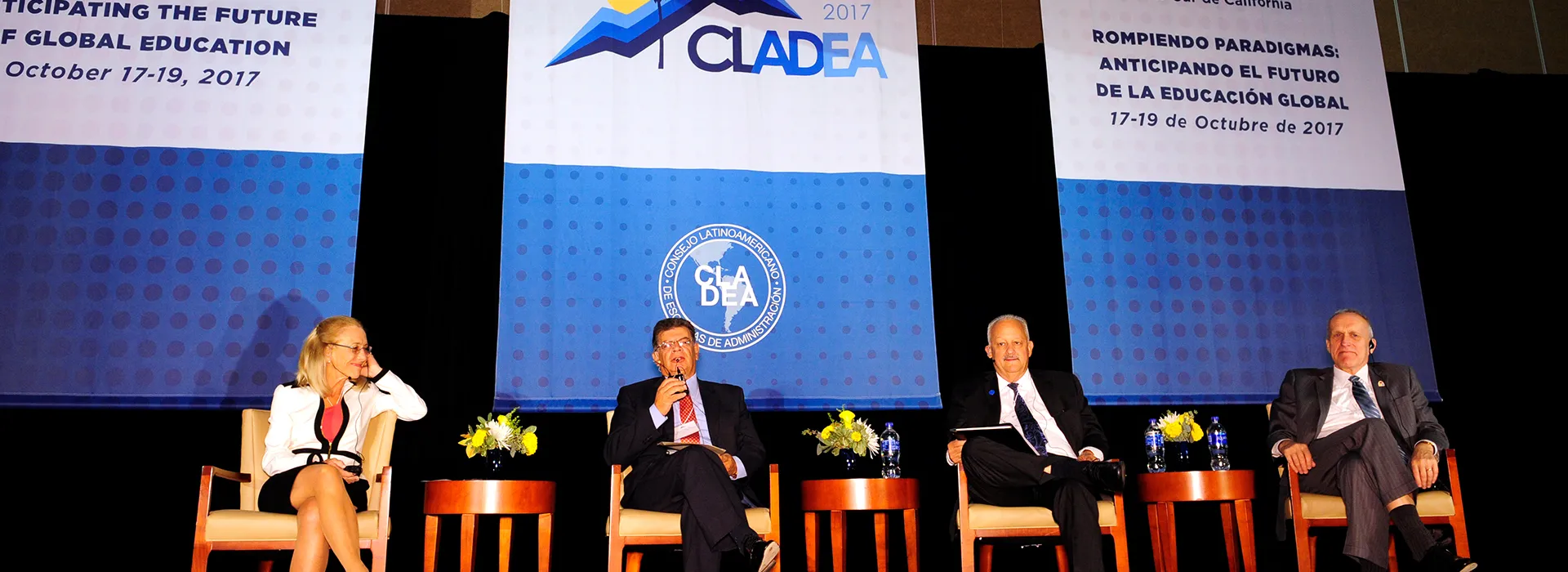Joe Gutierrez Office of Strategic Communication (909) 537-5007 joeg@csusb.edu

According to Gallup surveys of college graduates, those who take courses that have a “real world” aspect, engage in extended student-led projects and have professors who challenge them, are more likely to be satisfied with their education and long-term success.
So when the opportunity to co-host one of the largest educator event in the world presented itself, the Jack H. Brown College of Business and Public Administration not only successfully vied for it, but also spearheaded supporting local, state and global collaborations and potential student/faculty projects.
More than 500 academic administrators, professors and students from around the world attended the annual CLADEA gathering themed “Breaking Paradigms: Anticipating the Future of Global Education” in October, held for the third time in 52 years in the continental U.S. and for the first time on the West Coast.
The Latin American Council of Administration School, better known as CLADEA, is an international organization that brings together higher education institutions and international organizations dedicated to teaching and research in the field of administration. The program included a Dean’s track and a paper/ poster/ interactive track, besides keynotes, cultural activities and Southern California visits.
As a Hispanic-serving institution with more than 60 percent of students identified as Hispanic or Latino, Dean Lawrence Rose said it makes sense to be more involved with the organization that originated in Latin America, but now has connections to more than 230 private and public institutions worldwide.
There is a three-fold benefit he said, including:
- Increasing opportunities for students and faculty
- Developing community relations, especially among Inland Empire business involved in exporting
- Leveraging our reputation as a regional leader and continuing the precedence through a potential new summer program
“The next generation is going to have to understand globalization, be more flexible, be able to think critically and out of the box to be able to compete.” says Kimberly Collins, Ph.D., professor and director of the Leonard Transportation Center, as well as chairwoman of the 2017 CLADEA Assembly. “Hosting the Annual Assembly provides our students and faculty the opportunity to interact with faculty and leaders from institutions from all over the world.”
Over three days, more than 50 CSUSB students, staff and faculty were able to host, interact or participate in the fall event that attracted professionals from about 20 countries.
Timothy White, chancellor of the 23-campus California State University system, helped welcome the educators. White urged the attendees to “work together to build partnerships that break the mold.”
“When we build partnerships with colleges, governments and organizations beyond our borders, we foster more opportunities for our students to study abroad and experience new cultures while faculty and staff share ideas and develop cutting-edge research,” White said. “And when we build partnerships with the private sector and industry groups, we can gain valuable insight in our curriculum and create more internship and employment opportunities for our students and alumni.”
“There’s no doubt that partnerships like these — and many, many others — are absolutely vital to our success today, tomorrow and in the future,” he said.
CSUSB President Tomás D. Morales, who introduced White, told the attendees that he was very “interested in international exchange programs with many of the institutions in attendance that will benefit both our students and faculty. We have much to learn and share.”
Morales said he was hopeful that, through the conference, CSUSB “could build lasting relationships with CLADEA members for many years to come.”
Kim Wilcox, chancellor of UC Riverside called the gathering “a special night for Riverside because all of the Americas are here. It reminds us that we have so much in common,” Wilcox said.
Keynote speaker Lesley Wilson, Ph.D., the secretary general of the European University Association, spoke about network building in higher education and research across borders, and its crucial role for the development of societies, underlining its impact on students, teachers and researchers.
Offering an incredible global learning experience using technology to eliminate distance problems is one change needed to increase student success, says Rob Curtin, director of Higher Education for Worldwide Public Sector at Microsoft and a keynote speaker at the conference. Focusing on students as consumers and using the evolution of consumer services as a roadmap for how higher education will evolve will help educational institutions, he says.
“Digital transformation for higher education is to swipe right on learning,” says Curtin.
On the flip side, he says the degree to which an individual can create community, learn and utilize electronic networks or systems, the more likely they will be able to keep pace in the world.